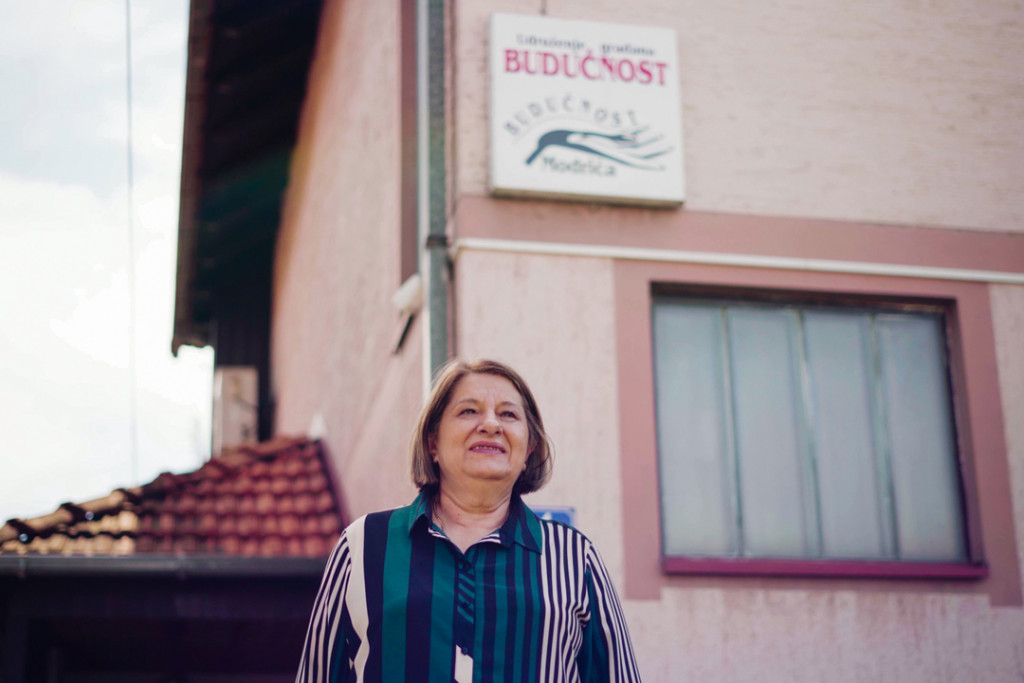
Written by Osman Zukić
Photography by Almir Kljuno
Modriča after the war. Refugees were on the streets. Returnees were looking for their homes. Shop windows and streets were desolated. Refugees were looking for a place to settle in. Even the refinery was out of operation. The town, which had grown to serve it, lost its purpose. Everyone was looking for something in a place where the threads had been broken. Some needed identification documents, some sought the return of their property, while some wanted to go abroad to their children.
The grip of the war was still tight.
Gordana Vidović, a returnee and law graduate, was trying to make sense of everyday life. Without a job and without hope of finding one soon, she and her colleagues started providing free legal aid to women, war widows, refugees, and people with disabilities...
Before that, they had to find a space and equip it, procure computers, and register the association. The institutions were just starting to work and were distrustful of them. People were asking who they were. What did they want?
They shared their knowledge and experience and learned along the way. They were a beacon in the post-war darkness. A place where you could come and look for someone to whom you could complain, if nothing else. A home where you could find peace and security. A home where the Association Budućnost was founded.
These women just wanted to restore the city to its proper state and get it moving again.
Thirty years later
“All these years have been turbulent. Just when you think you're one step ahead, someone pushes you two steps back, and it's always like that. Distrust. When we started applying for funds from foreign donors, we were called foreign mercenaries. They would leave nasty messages on our doors,” begins her story Gordana Vidović.
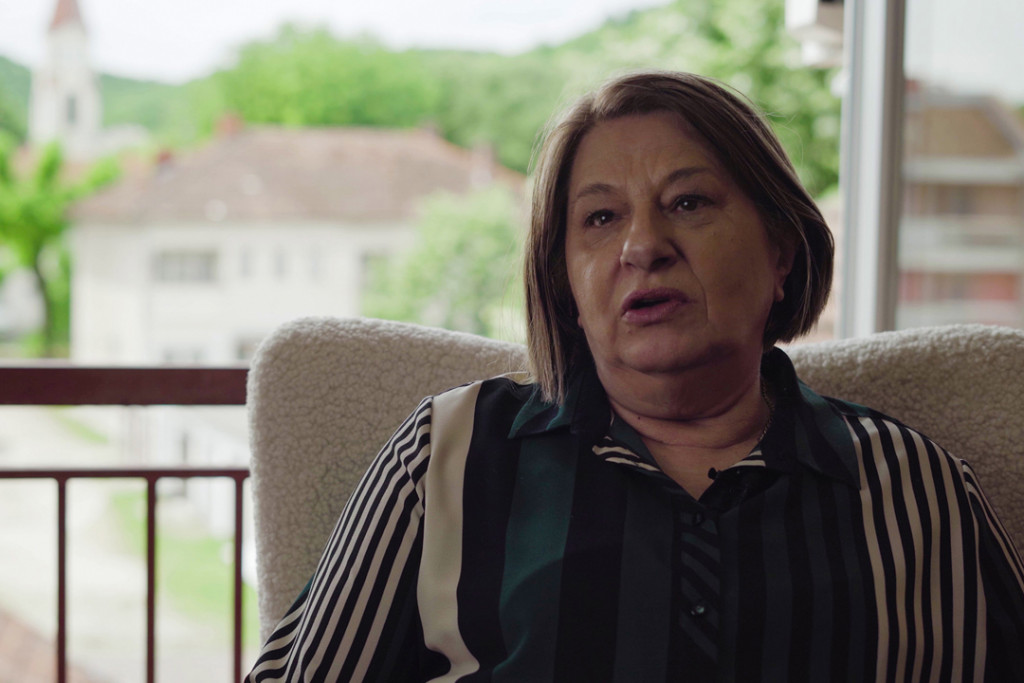
For years, people who needed help came to them. The association acquired a reputation in the community and in institutions. They launched various campaigns for a fairer society. They proposed legislative solutions. Including the one to criminalize domestic violence. They established an SOS hotline, the first one in the Republika Srpska. People could report a problem, if they were in need or if they were victims of violence, persecution, hate crime...
“When domestic violence was criminalized by law, I thought at the time that our work on violence was finished. But, twenty-four years later, we are still struggling with even more severe cases. We have witnessed some unbelievable cases of women and children killed in their families.”
In Bosnia and Herzegovina, almost two and a half thousand cases of domestic violence were reported just last year.
“It is hard to believe that there is the law, there are institutions, and experts, and yet in the end we have situations where someone kills his wife and children just because he thinks they do not deserve to live.”
Safe house
A woman with three children was sitting one morning in front of the office of the Association Budućnost. She complained to Gordana about her husband, an abuser who had thrown them out onto the street, and she asked for help. Gordana found them a safe and hidden apartment where they stayed for several months.
This happened in 2000, and they had no idea where this would lead.
"She had survived hell in her life and would not have waited for us there if it was not critical. She had nobody else to talk to," says Gordana, adding that the woman now lives in France with her children.
This was when the idea of a safe house for women and children suffering from domestic violence was born. The house was subsequently established and it was the first one in the Republika Srpska. Today, they have three, with additional houses in Banja Luka and Bijeljina.
About twenty persons are accommodated in the house, including children, victims of violence and trafficking, without parental accompaniment.
“We encourage and empower children to testify in court,” emphasizes Gordana.
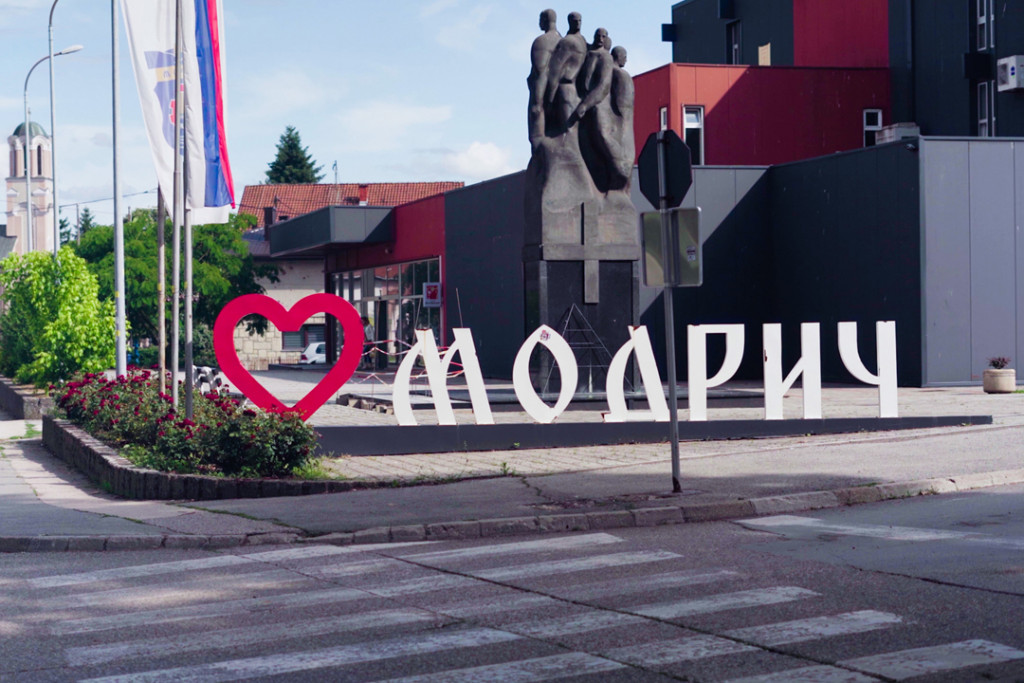
When they established the safe house, they did not know what they were doing. They learned along the way how it should function, establishing their model, recognized as the Modriča model. This model involves formulating all lessons learned as legislative proposals, which they then advocate for adoption. This is how sheltering in a safe house became a legal obligation in the Republika Srpska, with each person's stay in the safe house funded by the government (70%) and local budgets (30%).
Gordana says that by doing so the government has taken on the obligation and responsibility to provide shelter in safe houses. But sometimes it does not work. What happens is that local social welfare centers, concerned about municipal budgets, fail to recommend someone for sheltering in a safe house.
Gordana says that they must not admit women and children “on their own accord.”
Paradoxically, she continues, a woman who is a victim of violence from the neighboring municipality of Odžak must seek refuge eighty kilometers away in Tuzla, where the nearest safe house is in the Federation of Bosnia and Herzegovina.
What does the law say?
The Law on Protection Against Domestic Violence, adopted in both the Federation of BiH and the Republika Srpska, prohibits any form of violence against women, especially domestic violence. It prescribes urgent and protective measures, including removing the abuser from the home, restraining order, and sheltering the victim of violence in a safe house.
“Social welfare centers often calculate because they are careful with the municipal budget, and that's why they rarely prescribe sheltering for a victim in a safe house. They do it only in drastic situations, when they think it is necessary,” explains Gordana.
Gordana was also a member of the working group where she worked with her colleagues on drafting the new law on domestic violence. This was after the femicide case in Gradačac, when Nizama Hećimović was killed.
“We proposed that the government fully takes over the funding of someone's sheltering in a safe house. In this way we would avoid situations where local social welfare centers, due to a lack of funds, fail to shelter someone in a safe house.”
Although the Istanbul Convention stipulates that a woman can on her own ask to be sheltered in a safe house, this bill has never come to a vote in the National Assembly of the Republika Srpska.
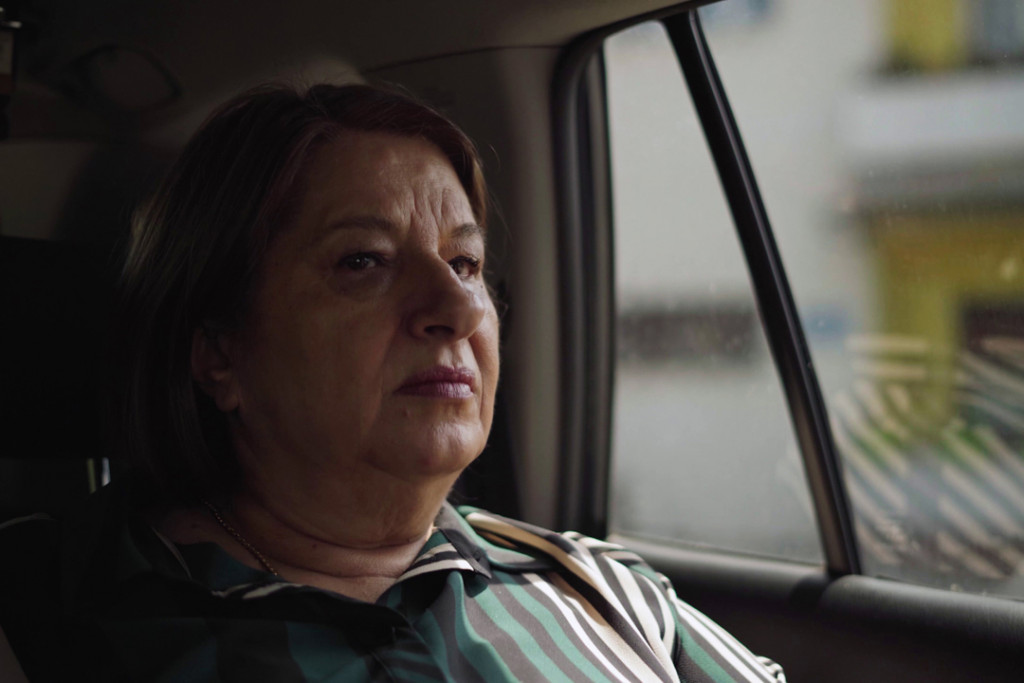
According to the definition, femicide is a recurring pattern of abusive behavior that tends to escalate in intensity and frequency to the point where the abuser kills the woman. Experts warn that this crime is often the culmination of systematic violence the victim has endured over a certain period of time.
Although it is discussed publicly, the term femicide has not yet been incorporated into the laws in Bosnia and Herzegovina.
It is not enough just to pass a new law and introduce a new article. Once a crime is committed, explains Gordana, how it will be incriminated depends on the reaction of the first people on the scene.
“Whether it will be classified as murder, aggravated murder, femicide, etc. Ultimately, sanctions depend on it. Everyone must work, especially the police, in cooperation with social welfare centers and the prosecutor's office.”
Possible causes
Why have there been more cases of domestic violence in the past five years? According to some data, 19 women were killed in 2021 and 2022. In the last ten years, 71 women were killed.
“First and foremost, the state has not addressed the issue of PTSD after the war. This is one of the key problems in our society,” says Gordana.
This would cost the state because it would require compensation and obligations in the form of disability pensions and psychological support for those who have experienced war-related trauma.
“Everything is turbulent here. Constantly. It is turbulent whether you will get a job and how you will get a job. If you are a member of a certain political party, you have a job. If that party loses, you lose your job. Some people are constantly tense. There is always talk of secession, referendum, and abolition...They scare people.”
Stress is rising.
“Not everyone can endure that level of stress. When a breakdown occurs, those who are the weakest suffer, and those are family members.”
Only 35 percent of working-age women are employed in Bosnia and Herzegovina. This is the lowest percentage among the countries in Southeast Europe.
“You know, we are a traditional society where the man is supposed to provide food on the table. If he is unable to do this, he feels frustrated. It is not without reason that experts have said that it takes two or three decades after the war for trauma to escalate. That's what we are experiencing now,” says Gordana, emphasizing the importance of preventive measures.
“Economic empowerment of women is something that needs to be worked on. Besides war trauma, social vulnerability usually leads to violence. And women in general fear reporting violence because they are economically dependent on their husbands. Or they return to them for this reason.”
One of the models that is functional in the world, and could be a solution in Bosnia and Herzegovina is the alimony law. According to this law, the state takes responsibility and pays the alimony amount to the woman, while the husband, until he pays that amount to the state, does not have the right to, for example, register a car or obtain any document.
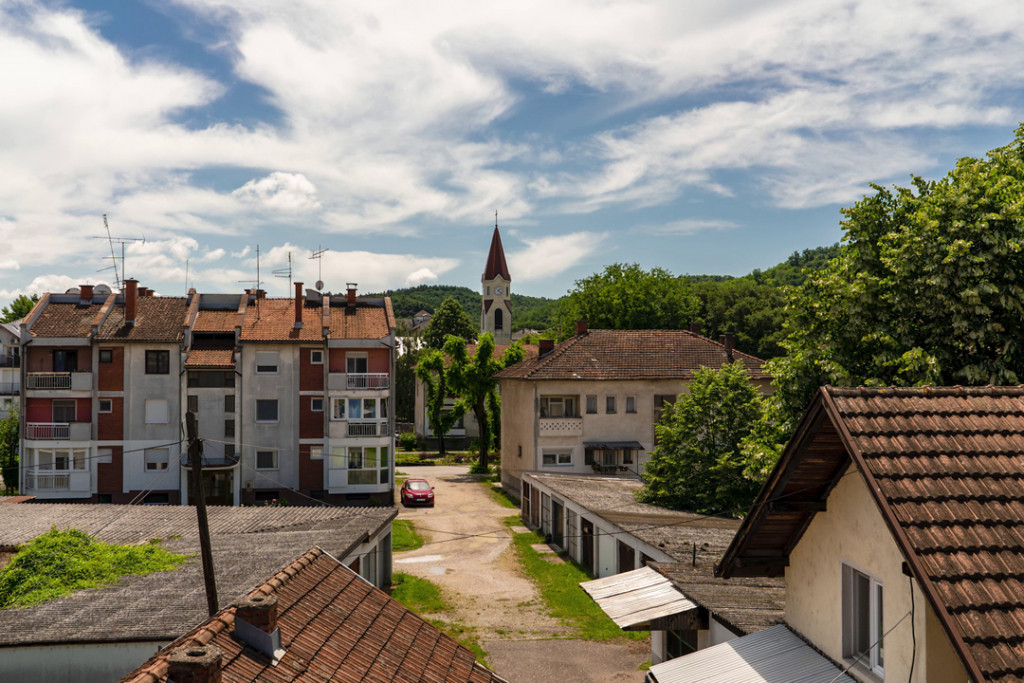
Images of us
A woman once came to the safe house, even though she had two married daughters she could have gone to. She was afraid her husband would find her there. She knew he had a weapon, and when it was confiscated, he sold a cow and bought a new rifle. With that rifle, hidden under his coat, he would walk around Modriča, looking for his wife. In the end, he committed suicide.
“So, he wanted to kill her,” concludes Gordana, who shared this story with us.
In Bosnia and Herzegovina, over eighty percent of women consider domestic violence a private matter and would not report it. Experts can recognize violence, but in small communities where certain powerful individuals have too much power, there is even fear among representatives of institutions to initiate specific mechanisms.
“We have had many cases where a husband and wife would walk arm in arm, hugging, but in reality, the wife was going through hell, and it ended with her husband throwing her from the second floor. So, there are different situations that you sometimes cannot recognize. Even parents cannot recognize what is happening in their daughter’s home.”
During the pandemic, an increase in femicide was recorded in almost all countries. Mostly in Greece, Slovenia, Germany, and Italy. There are no official data on this in Bosnia and Herzegovina.
“Institutions were working with limited capacities and for much shorter hours than normal office hours, so we had an increase in the number of SOS calls, and we had an increase in the number of persons we sheltered in our safe houses based on these calls. During that period, violence against the elderly also increased. Now, what caused this, I don’t know,” admits Gordana.
Bosnia and Herzegovina ratified the Istanbul Convention in November 2013, thereby committing to undertake legislative and other measures to ensure legal, institutional, and organizational frameworks for the prevention of violence against women, protection of victims, and sanctioning of perpetrators of violence.
For femicide cases in Bosnia and Herzegovina, 29 verdicts have been pronounced so far, mostly prison sentences.
The biggest problem is that perpetrators commit violence again after serving their prison sentences.
Let them abolish us
The women at the Association Budućnost, who established the safe house in Modriča, have been resisting pressure, threats, and attacks for thirty years. They have been labeled as foreign agents, funded to destabilize the authorities in the Republika Srpska.
Although barely, they have managed to ensure their continuous work. They often provide services and do what the system should be doing. For every step forward, they must take dozens of steps back. They loudly advocate for equality, justice, and fairness.
They are constantly threatened.
They are threatened by the Law on the Special Register and Publicity of the Work of Non-Profit Organizations which would put them on the list of foreign agents because they are mostly funded, through projects, from abroad. The law has not yet been adopted, but it is very present in public discourse.
Gordana, who returned to Modriča to help herself and those in need, concludes by saying:
“Now, after everything, if it is not in the interest of the state that we continue working - let them abolish us.”
Today, almost thirty years later, Modriča has been rebuilt. Occasionally, graffiti with nationalistic messages spoil the impression of peace and tranquility that the flatland landscape evokes. The Russians privatized the refinery long ago. It seems like everything is the same as before, but nothing is the same.
A state that needs associations like this one to serve as a backup for institutions when they lack the capacity to handle certain social problems is not good. But it can be better.
A government that prohibits or restricts the work of such associations, which act as an extension of the institutions when they are unable to provide their citizens with the protection they are guaranteed, is not good. And it cannot be better.
In safe hands
Gordana takes us to the safe house built next to one of the busiest intersections in Modriča. The lights are dimmed. A large group of women and children are in the living room. We see a sewing machine. On the walls, there are various crafts: from children's drawings to tapestries. A woman, who asked us not to reveal her identity, tells us this story.
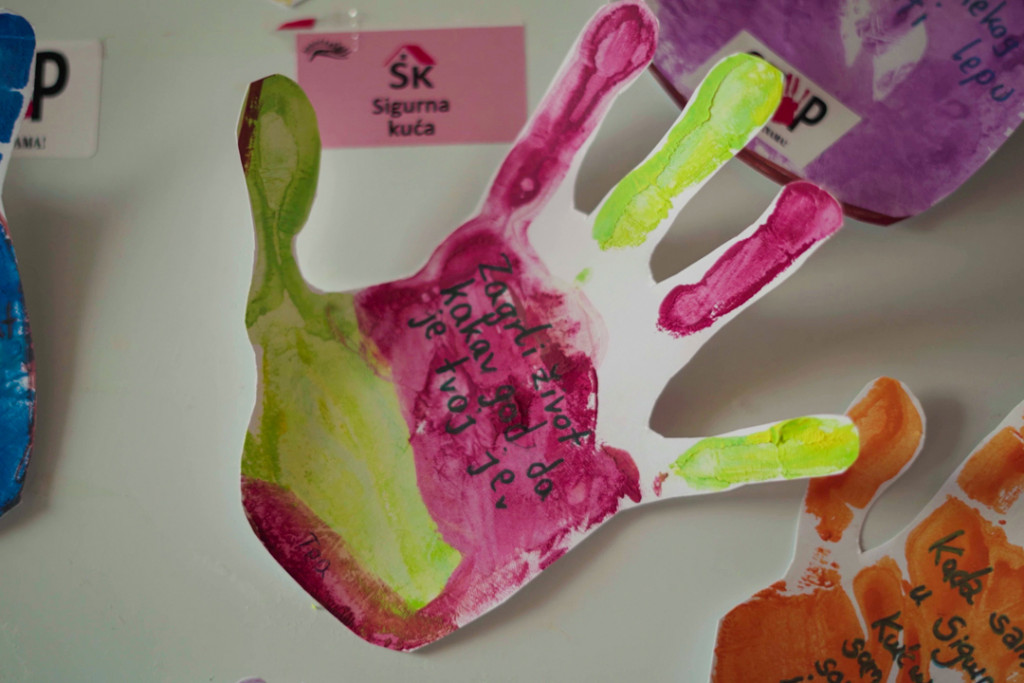
I sought help to save myself and my child. I suffered from domestic violence. I was married for fifteen years and I told myself: enough already, I don't want to suffer anymore, I want to save myself and my child in a safe house. (...)
I cook, clean, and work a little on the sewing machine. I mean, I love doing housework, being a housewife, and being a good mother for my family. It wasn't hard for me, I endured it for as long as I could, and when I saw it wasn't getting better, I realized it was better to seek refuge for myself and my child than to endure it. What to do?
I don't know now how that violence happened. I don’t want it to happen again. (...) I would recommend every woman to save herself and her family. There is always a way out. (...)
I reported it, but then our daughter would reconcile us, again and again... Nothing better awaits me, beatings await me, and that's it. The man was really aggressive, how can I put it, he spent many years in prison, as a young man he was in prisons, he became edgy in prisons, and now he's venting his psyche on me, and it’s not my fault. I was a housewife, a good mother, I cleaned, cooked, and tidied up... I even washed his feet, if you can believe it. I treated him with such care as if he was water in my hand, I almost bathed him, and his way of thanking me was to beat me. And I told myself, I don’t want to endure violence anymore, I want to save myself and my child.
It was hard for me, I ran away to my family, but they are afraid of my husband and they suggested I seek refuge in a safe house; they no longer dare to take me in because they are truly afraid. My husband is aggressive, he threatens to throw a bomb, to kill them... And they also have their families, their children. (...)
Now, I feel good, safe, I'm with my child, I live for her, I would die for her. I have a beautiful, delicate daughter, she is like me, she likes to be a housewife, she knows how to cook, she behaves, she respects the women around her, she is grateful just like I am.
(...) There is a woman I talk to, and somehow, she eases my mind, she helps me get it off my chest.
I would recommend every girl and woman to seek help immediately, not to suffer violence. Once a man hits you, he starts to like it, then he starts to mistreat you, hit you and insult you every day, both psychologically and physically. I respect a man who appreciates his wife, loves her, doesn't hit, or yell, I respect that in a man. There are arguments in every marriage, shouting, but don't hit me, don't insult me, don't kick me, don't spit on me like my husband did to me. There was nothing he didn’t do to me, I was covered in bruises, pardon me for saying so, and my body and my legs too. I barely recovered, but good doctors helped me and good people around me.
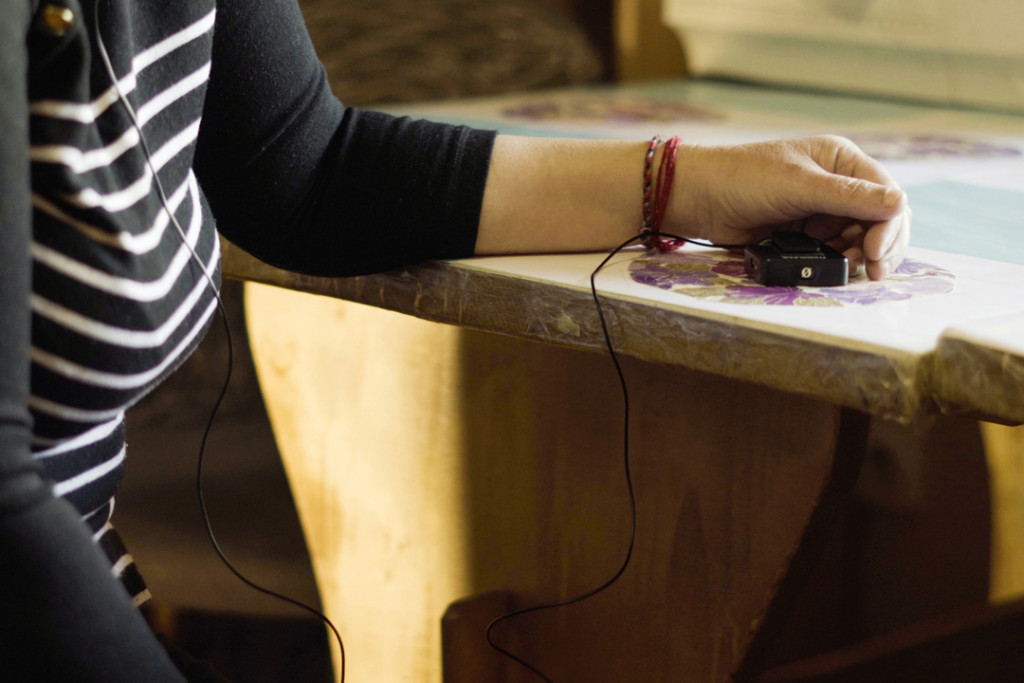
When I leave here to go home, I will cry. It's hard for me when I talk about my life. What can I do, God?
I'm a good person, a kind soul. I like to help everyone. I would give you my blood, if needed. I’m that kind of person...Some women don't let themselves be hit, they hit their husband, but I'm not that kind of person, I endured it and saw it didn't get any better. (...)
God gives us strength, salvation, and life.
That man is somehow aggressive, somehow edgy. I suggested we both see a psychiatrist, to see if it was me. But it was not me, it was him. He was really edgy, when we argued, he would foam at the mouth, he would foam when he argued with me and hit me. He said he had no heart when he was hitting me; there was nothing he didn't say to me. He would curse my dead family, my living family, start kicking, hitting, pulling my hair, throwing me on the floor, there was nothing he didn't do.
The neighbors tried talking to him, but it is not possible to speak with this man nicely, he is set in his ways.
It is as if someone cast a spell on him to hate me, I don't know what it is, what the reason was.
I was a housewife and a good mother, I cooked, cleaned, and sent my daughter to school. (...) It's important to me that she eats, she can have a burek, and I will have a slice of bread with a spread, it doesn't matter.
In the house, there are mainly whispers, and whispers contain much more than screams.
(A story from the author's series "Activism in BiH: Lessons Learned and Missed" created with the support of the European Endowment for Democracy.)
